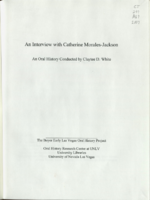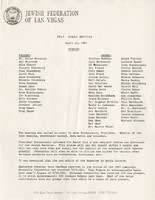Search the Special Collections and Archives Portal
Search Results

Transcript of interview with Melanie Greenberg by Barbara Tabach, June 14, 2016
Date
Archival Collection
Description
When Melanie Greenberg was a young girl in her hometown of Kansas City, Missouri, she thinks it is likely that she crossed paths with her future husband at Hebrew School. However, it would be years later in college when they officially met – and fell in love and married in 1970. By 1976, Missouri was in the rearview mirror and career opportunities for her husband Gene Greenberg would lead them to Las Vegas. With their 18-month-old daughter Sari, they drove into Las Vegas for the first time, down Boulder Highway to Flamingo Road. Gene’s employer had arranged for a room at the Flamingo Hotel. As she explains, there many have been a better route, but it brought them to town and they stayed, raised their family, and became fixtures in the community since that moment. Among their first goals was finding a synagogue. Melanie’s magical touch has been felt in many places within the Las Vegas Jewish community: an active member of Temple Beth Sholom, the Jewish Federation’s Young Leadership and Women’s programs, organizer of Hebrew High, coordinator of L’Dor V’Dor activities for seniors, and Executive Director of Hillel from 1996 – 2003.
Text

Transcript of interview with Cathy Morales-Jackson by Claytee White, May 5, 2010
Date
Archival Collection
Description
Catherine (Cathy) Morales-Jackson grew up in the suburban tranquility of Hazlet, New Jersey, with five siblings, a stay-at-home mom and her father, who served the community as mayor and as a school board member. In 1981, "on the day Princess Diana go married," Cathy moved to Las Vegas with her boyfriend/future husband and her mother-in-law. Life in Las Vegas was distinctively different than living in New Jersey she explains. For the next 15 years, they lived at Delta Gardens apartments on Paradise. She started working at UNLV's library as it was moving into a new building. He first position was in the periodicals and microfilm area and in binding. She contrasts both details of the campus and the city then with how it is today. At the time of this interview, Cathy was taking an early retirement at the age of 51. She provides a retrospective of a range of library topics: from the thousands of volumes she bound to the move to Lied Library, from a Celebrity Pancake fundraiser to staff parties, and from the implementation of a campus parking fee to the various library organizations that she has belonged to over the years. Cathy loved her years in the university libraries and feels that the current budget crises is the biggest change she has witnessed. Retirement came at an opportune time for her, but she worries about the future for others.
Text

Jewish Federation correspondence, meeting minutes, and other records, item 07
Description
Board meeting minutes for the Jewish Federation of Las Vegas, Nevada, April 22, 1987.

Transcript of interview with Theodore R. Garrett by Marilyn Swanson, March 2, 1975
Date
Archival Collection
Description
On March 2, 1975, Marilyn Swanson interviewed Theodore R. Garrett (born 1898 in Overbrook, Kansas) about his life in Boulder City, Nevada. Garrett first talks about his move to Las Vegas to work for Six Companies during the construction of Hoover Dam. He then describes his job as a truck driver at the dam, the wages paid at the time, and the construction of the buildings and other housing in Boulder City. Garrett also mentions the food provided to the workers, the recreational activities available, and his family’s move to Boulder City.
Text
Shake, Rattle and Roll: Nevada Test Site Wives and Children Oral History Project
Oral history project conducted through the Oral History Research Center (OHRC) at the UNLV University Libraries.
Corporate Body

Transcript of interview with Leander Fields Hayes by Mark Kevin Ryhlick, March 13, 1981
Date
Archival Collection
Description
On March 13, 1981, collector Mark Kevin Ryhlick interviewed local technician, Leeander Fields Hayes (born on May 23rd, 1907 in Salt Lake City, Utah) in his home in Las Vegas, Nevada. This interview covers the history of entertainment in Las Vegas from the mid-forties to 1958. Brother Hayes, as he requests the collector to call him, specifically covers the local live music and comedy scenes. He also touches on the topic of segregation and how Black entertainers, such as Lena Horne, were treated when they came to perform in Las Vegas, Nevada.
Text

William McLeod interview, March 16, 1978: transcript
Date
Archival Collection
Description
On March 16, 1978, Valerie McLeod interviewed her father William Lee McLeod (b. January 31st, 1937 in Los Angeles, California) about his life in Las Vegas, Nevada. McLeod begins by speaking about his career as a contractor, the growth of Las Vegas and the city’s population. Moreover, he speaks about recreational activities such as riding motorcycles and exploring mines around Nevada. McLeod also spends time going over Indian reservations around Nevada and neighboring states, the Lost City in Nevada, boomtowns and ghost towns. Lastly, McLeod talks about the history of water and springs in the state of Nevada, what he would consider to be the Old Ranch and the stagecoaches that passed through Gold Point, Nevada.
Text
Video interview with Rose Hamilton, Carolyn Haywood, Marilyn Armstrong, Hannah Johnson, Bobbie Gilmore and Delores "Dodi" Johnson, January 20, 2007
Date
Archival Collection
Description
Oral history conversation with Rose Hamilton, Carolyn Haywood, Marilyn Armstrong, Hannah Johnson, Bobbie Gilmore and Delores (Dodi) Johnson. The group shares memories of how they and their families came to live in Las Vegas during the late 1940s and early 1950s.
Moving Image
Audio recording clip of interview with Nafeesa Sallee by John Grygo, March 21, 2013
Date
Archival Collection
Description
Part of an interview with Nafeesa Sallee conducted by John Gyrgo on March 21, 2013. Sallee discusses her career transition to the banking industry, buying a home and when she first heard about the Westside.
Sound

Transcript of interview with Katherine McKee by Claytee D. White, September 3, 2016.
Date
Archival Collection
Description
Interviewed by Claytee White. History of passing in Las Vegas after integration is mandated. McKee danced at the Mint, The Silver Slipper's Minsky's Burlesque and the Dune's Viva Les Girls. Performed in Les Girls Montreal road show as well. Hosted the Los Angeles Morning Show, actress in many shows and movies, and was Sammy Davis' "road wife."
Text
